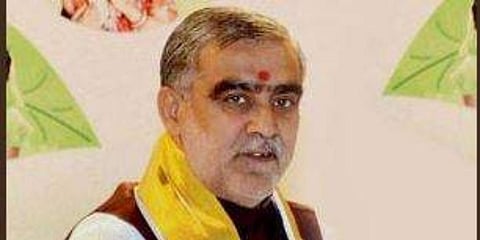

NEW DELHI: India has successfully phased out the production and consumption of several major ozone depleting substances, Union Minister of State for Environment Ashwini Choubey said on Thursday.
Chairing an event on the 27th Global Ozone Day, he also said that the country met all obligations of the Montreal Protocol by accessing technical and financial assistance from the mechanism of the Protocol. The theme of World Ozone Day 2021 is 'Montreal Protocol - Keeping us, our food and vaccines cool'.
"One of the reasons for India's success in phasing out ozone depleting substances (ODS) is the involvement of key stakeholders both at the planning as well as implementation levels. Industries, research institutions, line ministries, consumers, among others, have been contributing significantly to the ozone depleting substances phase out programme of the Montreal Protocol in India," Choubey said.
Referring to Kigali Amendment to the Montreal Protocol, which was recently ratified by India, the minister said that issues relating to minimising industrial obsolescence and adverse economic impacts should appropriately be addressed while developing a hydrofluorocarbon phase down strategy for implementing it.
World Ozone Day is celebrated on September 16 each year to commemorate the signing of the Montreal Protocol, an international environmental treaty for phasing out of production and consumption of ozone depleting substances, that came into force on this day in 1987.
The Day is celebrated every year to spread awareness among people about the depletion of ozone layer and the measures taken to preserve it. The Ozone Cell, Ministry of Environment, has been celebrating World Ozone Day since 1995 at the national and state levels, the ministry said.
Choubey also released the action plan for implementing recommendations of the India Cooling Action Plan (ICAP) for thematic area space cooling in buildings. The Action Plan has been developed after mapping of the recommendations given in the ICAP and after detailed discussions with various stakeholders, including line departments and ministries.
"The ICAP, first-of-its-kind in the world to be developed by the environment ministry, addresses cooling requirements across sectors and lists out actions which can help reduce the cooling demand through synergies in actions for securing both environmental and socio-economic benefits. The ICAP aims to reduce both direct and indirect emissions," the ministry said.
Choubey also released a report on cold chain sector in India for promoting non-ozone depleting substances and low-global warming potential refrigerants, and another report on public procurement policies for refrigeration and air-conditioning equipment using non-ODS based refrigerants.
He also released the winning entries of poster and slogan competitions held on the occasion across various schools in India. More than 3,900 students participated in the competition.
Environment Secretary RP Gupta, UNEP India Head Atul Bagai, UNDP India Resident Representative Shoko Nada and various representatives of industries, industrial organizations and other stakeholders, and over 3,000 school children participated in the virtual event.
India, as party to the Montreal Protocol since June 1992, has been successfully implementing the Montreal Protocol and its ozone depleting substances phase out projects and activities in line with the phase out schedule of the Protocol.
India has phased out chlorofluorocarbons, carbon tetrachloride, halons, methyl bromide and methyl chloroform for controlled uses in line with the Montreal Protocol. Currently, hydrochlorofluorocarbons are being phased out as per the accelerated schedule of the Montreal Protocol.
Hydrochlorofluorocarbons Phase out Management Plan (HPMP) Stage-I has been successfully implemented from 2012 to 2016 and Hydrochlorofluorocarbons Phase out Management Plan (HPMP) Stage-II is currently under implementation from 2017 and will be completed by 2023, the ministry added.